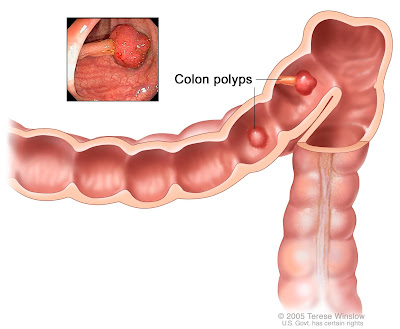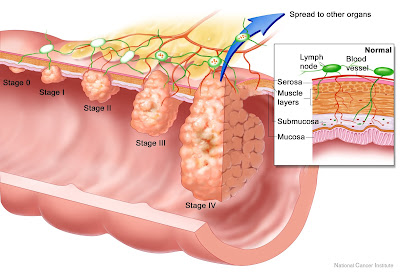 |
| Everything about colon cancer (image 1) |
Prof. Dr. Ömer Necip Aytuğ
specialist in Gastroenterology, bowel cancer (colon cancer) gave information
about. Malignant tumors of the large intestine colon cancer is the general name
of Dr. Aytuğ who stated that, “the vast majority originate from cells in the
lining layer of the large intestine (lung cancer)and into the intestine called
polyps, with the majority growing, fungus-like formations that begins on the
outside of the intestinal wall and grows rapidly and if it goes unnoticed or
blood to other organs in the body, shortness of breath (lymph) or directly has
the potential to spread through the neighborhood.
The most common metastasis
(splash) detected organs including the liver, lung, peritoneum and lymph nodes
environmental. Cancer originating from cells of the intestine and of lung
cancer cases observed in the other available. mucin cancer called adeno the
prevalence of a more aggressive cancer cells containing slimy formation in the
case of tumor growth and treatment response, it has the characteristic to
worse,” he said.
Who is at risk?
The majority of cases,
indicating that 93 percent of over the age of 50 Prof. Dr. Aytug, “is seen with
equal frequency in males and females. When men and women are evaluated together,
the 3 of death from cancer. the order of cancer deaths in men 3. the order of
cancer deaths in women 2. takes place during.
Much 30-35 per cent of cases
the rectum (back passage closest part of the bowel), 25 percent for much of the
sigmoid colon (located on the left side of the colon and rectum, descending
part of the intestine), 40 percent seated left descending part of the
intestine, 10-13 percent transfer partial bowel (the colon between the
descending and horizontal portions coming out of the middle section), and 20-25
percent called ridiculous shots of the large intestine that connects the
intestine to the descending intestine and its sequel the startup section which
is located on the right side of the section.
All over the world including
our country, the vast majority of cases while the left was more frequently
observed in intestinal sections near the rectum, in women of black descent
abroad, which is the initial part of the intestine on the right side (the shot
to the gut) tend to be more common.
Uterine, ovarian or breast
cancer with women, mothers, fathers, siblings immediate family members, such as
those of bowel cancer or polyps in inflammatory bowel disease (ulcerative
colitis or Crohn's ) colon cancer in people who have had treatment is at risk.
Colorectal cancer will develop in people who have specified risk factors does
not mean that; it is just more likely than other students has increased.
Therefore, more careful control of the disease and reduce your risk, if this
occurs, early diagnosis and treatment should pay attention to,” he said.
CLINICAL COLON CANCER WHAT ARE THE SYMPTOMS?
The population of microbes
in the intestines of people with bowel cancer (intestinal flora) that may be a
relationship between the intended, noting that Dr. ömer Necip Aytuğ, gave the
following information:
The bacteria from the
intestine in the intestine acids and
steroid substances in foods that trigger cancer in the structure of the
substances (carcinogens) speaks to you.
Polyps or cancer in the colon cancer cells in a biopsy from the diseased tissue
of patients with coliform bacteria( E. coli) are significantly higher in the
control group, the incidence of individuals. Apart from these, in the family
first-degree relatives of individuals with colon cancer from normal colon is
2-3 times more risk of developing Cancer Society.
Also be hereditary also as
some diseases that increase the incidence of bowel polyps ( FAP-familial
polyposis coli syndrome, gardner syndrome, turcot syndrome, etc) colon cancer
can often be cured.
Apart from these, hereditary
nonpolyposis colorectal cancer Familial Syndrome (Lynch syndrome), an inherited
disorder of the body's cells in the renewal of the division of protective genes
in the cell nucleus as a result of inherited disorder that fixes the errors in
the mid-40s, especially located on the right side of the colon (ascending
colon, shooting) bowel cancer is common.
Family history of colon
cancer in family, smoking, being overweight, or you yourself have a history of
polyps in the family, lack of Exercise, consumption of vegetables is less,
consume large amounts of alcohol (45gr/day and more) high-fat, high-protein and
low-fiber Western-type diet are among the risk factors for bowel cancer.
Aspirin and /or nonsteroidal
anti-inflammatory drugs, the consumption of dairy products and vegetables and
consume regularly reduces the risk of hormone therapy in women.
The large bowel affected by
ulcerative colitis, Crohn's disease, chronic skin disease such as inflammation
bowel disease in the degree of involvement, duration, and 10 years after the
person's regular cases going untreated, increasing the risk of colon cancer.”
What is the diagnosis and treatment of colon cancer?
A careful patient history,
physical examination, complete blood count, biochemical tests in the diagnosis
of the first methods who stated that Dr. Aytug, “the gold standard in the early
diagnosis of colorectal cancer colonoscopy a flexible tube with a camera called
the tip-shaped device (colonoscopy) through the anus by entering the entire
colon is displayed in detailed format.
Take a biopsy of suspect and
identified with this method, suggesting the formation of cancer, called polyps,
the formation of a large percentage of non-surgical be extracted as is possible.
Colonoscopy and biopsy to assess the degree of propagation of lymph nodes
detected by means of Computed Tomography, magnetic resonance imaging (MRI),
scanning methods such as PET are used.
The gold standard in the
treatment of many other cancers as in colon cancer, surgical treatment.
Laparoscopic surgical treatment also affects the bowel in which the tumor
section. If the segments in the left half of the colon is afflicted from the
top and from the bottom of the tumor tissue tumor of the bowel determined a
safe limit and only partial or in some cases, a long section is removed
(segmental resection).
The horizontal portion of
the intestine called the transverse colon tumours seated in the right side or
the whole of the adjacent part of the transverse Colon and the right colon or
the left side in the middle of the section close to the much larger part of the
small intestine the colon is removed and the three remaining duly connects.
Rectal cancer the rectum a
tumor in the rectum to completely cancel and leave a safety margin if placed
too closely to part of the tumor is removed and the intestine to be permanently
sewn to the abdominal wall (colostomy), the patient's to do with the way the
bag of feces.
Long-term blockage of the
tumor tissue post symptoms sufficient distance although it is the last portion
of the large intestine at the top and bottom diameter difference of the
diameters, it shows in ways that are incompatible with each other, or if the
bowel require a colostomy in cases of temporary opening of the intestine that
may require urgent opening dirty. Then the majority of these cases, the
colostomy is closed and the end of the intestine, through the anus upon the
patient's standing at the firm, remaining with him is guaranteed to defecate,”
he said.
A large percentage of tumors
of the large intestine is resistant to radiation therapy called radiotherapy,
noting that Dr. ömer Necip Aytuğ, said:
“For this reason, in the
path of radiation therapy the conventional treatment protocol is not used.
Built in the intestinal part called the rectum in the case of bowel cancer,
surgical treatment of the tumor before radiation therapy with complete excision
of the tumor increase the chance of the patient then the process of downsizing.
Surgical treatment of the
tumor while it is being removed intestinal segment according to the placement
of bowel within the abdomen that are located in specific regions around and at
the same time the lymph nodes are also removed in the body and other abdominal
organs, the abdominal membrane has spread beyond the margins and whether or not
the eye is controlled by. Is stuck in the bowel wall and the surrounding tumor
to the lymph nodes or has spread to other organs surgery and additional
treatment is not performed periodically if treatment is not sufficient and the
patient clinical, biochemical ( tumor markers), radiological (CT, MRI, pet,
etc.) and Endoscopy (colonoscopy) is monitored with methods.
In the case of bowel tumor
detection in lymph glands and other organs or environmental, patients called
chemotherapy, tumor growth suppressing, tumor's ability to replicate the jump
that prevents or reduces the possibility of dividing cells composed of a combination
of drugs that inhibit chemotherapy protocols are applied and patient monitoring
with the methods mentioned above are taken.
It extends the life span of
patients, although 5-year tumor stage is low. Endoscopic or surgically removed
polyp has been removed, and yet the initial state is detected in many low-grade
colon cancer 5-year survival 90 percent of the time, the decade is over.
Advanced stage colon cancer, the percentage is close to 10's.”

No comments